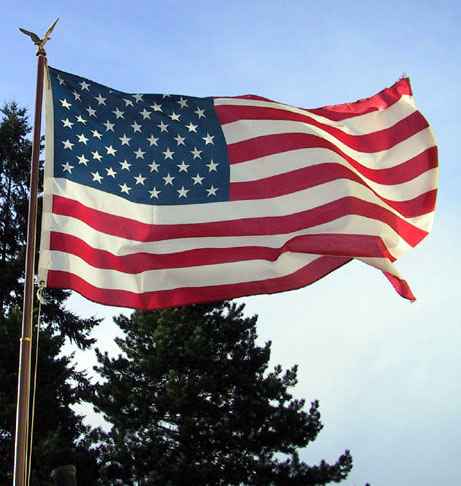|
The Cause of Liberty
"Life, liberty and the pursuit of happiness..." These are natural rights -- gifts from God, not government.
In speaking of the Constitution and of the American form of government he writes: It was with firm regard to this fact that our Constitution was written and ratified "in order to secure the Blessings of Liberty to ourselves and our Posterity." As such, it established a constitutional republic ruled by laws based on natural rights. John Quincy Adams wrote, "Our political way of life is by the Laws of Nature and of Nature's God, and of course presupposes the existence of God, the moral ruler of the universe, and a rule of right and wrong, of just and unjust, binding upon man, preceding all institutions of human society and government. At the close of the Constitutional Convention in Philadelphia, Benjamin Franklin was asked if the delegates had formed a republic or a monarchy. "A republic," he responded, "if you can keep it To that end, as a warning for future generations to beware of "cunning, ambitious and unprincipled men," Washington wrote, "A just estimate of that love of power, and proneness to abuse it, which predominates in the human heart is sufficient to satisfy us of the truth of this position." John Adams cautioned, "A Constitution of Government once changed from Freedom, can never be restored. Liberty, once lost, is lost forever Our Constitution is the oldest rule-of-law charter governing a sovereign republic. It authorizes a republican form of limited government with the express aim of defending individual rights, which are the gift of God. Those of us who endorse the most basic tenets of our Republic, "That all men are created equal, that they are endowed by their Creator with certain unalienable Rights, that among these are Life, Liberty and the pursuit of Happiness," are called to honor that heritage and set about the formidable task of restoring individual liberty and constitutional limits upon the branches of our national government. On liberty The words of these Patriots ring as true today as they did at the dawn of our nation: "The only foundation of a free Constitution is pure Virtue, and if this cannot be inspired into our People ... they may change their Rulers, and the forms of Government, but they will not obtain a lasting Liberty." --John Adams "Honor, justice, and humanity, forbid us tamely to surrender that freedom which we received from our gallant ancestors, and which our innocent posterity have a right to receive from us. We cannot endure the infamy and guilt of resigning succeeding generations to that wretchedness which inevitably awaits them if we basely entail hereditary bondage on them." --Thomas Jefferson "A nation which can prefer disgrace to danger is prepared for a master, and deserves one!" --Alexander Hamilton "They that can give up essential liberty to obtain a little temporary safety deserve neither liberty nor safety." --Benjamin Franklin "If you love wealth better than liberty, the tranquility of servitude better than the animating contest of freedom, go home from us in peace. We ask not your counsels or arms. Crouch down and lick the hands, which feed you. May your chains set lightly upon you and may posterity forget that ye were our countrymen." --Samuel Adams "Is life so dear or peace so sweet as to be purchased at the price of chains and slavery? Forbid it, Almighty God! I know not what course others may take, but as for me, give me liberty or give me death!" --Patrick Henry "If there must be trouble let it be in my day, that my child may have peace." --Thomas Paine To support and defend... The last line of our Declaration of Independence reads, "For the support of this declaration, with a firm reliance on the protection of Divine Providence, we mutually pledge to each other our lives, our fortunes and our sacred honor." Indeed, many first-generation American Patriots died fighting for American liberty. A decade later, their liberty won at great cost, our Founders further codified their independence and interdependence by instituting our Constitution, which specifies in Article VI, clause 3: "The Senators and Representatives before mentioned, and the Members of the several State Legislatures, and all executive and judicial Officers, both of the United States and of the several States, shall be bound by Oath [emphasis added] or Affirmation, to support this Constitution..." The Constitution prescribed the following oath to be taken by the president-elect: "I do solemnly swear that I will faithfully execute the office of President of the United States, and will to the best of my ability, preserve, protect and defend [emphasis added] the Constitution of the United States." If there is to be a peaceful transfer of liberty to our posterity, then we must return to principium imprimis, or First Principles. Short of another American Revolution to remove by force those who do not abide by their oaths, our freedoms cannot long endure unless we, the people, reaffirm what was well understood by our Founders: that our Creator is the only eternal assurance of liberty. The primacy of faith must be restored in order to preserve the conviction that, as Jefferson wrote, our "liberties are the gift of God"; traditional families and values must be restored as the foundation of our culture; individual rights and responsibilities must be restored as the underpinning of republican government; free enterprise must be unbridled from government constraints; and constitutional authority over each branch of government must be restored to ensure liberty, opportunity and prosperity for a civil society. The Cycle of Democracy has been accurately summarized as: From bondage to spiritual
faith; The Founders established a democratic Republic, not a democracy, in order to enfeeble this cycle, but with the erosion of constitutional authority, our Republic is now in grave peril of following the same cycle as have all other democracies in history. Only intervention by citizens and leaders who advocate for the primacy of constitutional authority, those committed to supporting and defending that authority above their self-interest, can save the Republic for the next generation. Today, the Constitution of the United States of America is the oldest rule-of-law charter governing a sovereign republic. It authorizes a republican form of limited government with the express aim of defending individual rights, which are the Gift of God.
Lois J Crawford 2010-2014
Insight"Liberty will not descend to a people, a people must raise themselves to liberty; it is a blessing that must be earned before it can be enjoyed." --English cleric and writer Charles Caleb Colton (1780-1832) "But what is liberty without wisdom, and without virtue? It is the greatest of all possible evils; for it is folly, vice, and madness, without tuition or restraint." --British statesman Edmund Burke (1729-1797) THE FOUNDATION"Public virtue cannot exist in a nation without private, and public virtue is the only foundation of republics. There must be a positive passion for the public good, the public interest, honor, power and glory, established in the minds of the people, or there can be no republican government, nor any real liberty: and this public passion must be superior to all private passions." --John Adams, letter to Mercy Warren, 1776
|

 In this article I have
paraphrased the ideas and words of Mark Alexander taken from several of
his articles as follows:
In this article I have
paraphrased the ideas and words of Mark Alexander taken from several of
his articles as follows:
